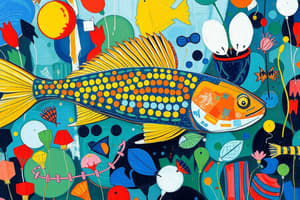Podcast
Questions and Answers
What is the main purpose of vermi composting mentioned in the text?
What is the main purpose of vermi composting mentioned in the text?
- To produce compost for soil improvement and plant growth (correct)
- To increase reliance on chemical treatments in fish farming
- To decrease the initial costs of fish farming operations
- To reduce pollution in fish farming operations
How do integrated fish farming systems contribute to fish health?
How do integrated fish farming systems contribute to fish health?
- By increasing pollution in the ecosystem
- By making fish production more expensive
- By decreasing the overall productivity of fish
- By reducing the need for chemical treatments (correct)
What is a challenge associated with implementing integrated fish farming systems?
What is a challenge associated with implementing integrated fish farming systems?
- Minimizing waste production
- Incurring higher initial costs (correct)
- Promoting a more sustainable ecosystem
- Reducing the complexity of farm management
Why are vermi composting systems beneficial for fish farming operations?
Why are vermi composting systems beneficial for fish farming operations?
What makes composite fish culture different from traditional fish farming methods?
What makes composite fish culture different from traditional fish farming methods?
What is the primary focus of new-generation aquaculture approaches like integrated fish farming?
What is the primary focus of new-generation aquaculture approaches like integrated fish farming?
What is the main goal of integrated fish farming?
What is the main goal of integrated fish farming?
How does composite fish culture differ from traditional fish farming?
How does composite fish culture differ from traditional fish farming?
What does vermi composting contribute to in fish farming?
What does vermi composting contribute to in fish farming?
What is one benefit of polyculture in integrated fish farming?
What is one benefit of polyculture in integrated fish farming?
How does Integrated Multi-Trophic Aquaculture (IMTA) contribute to sustainability?
How does Integrated Multi-Trophic Aquaculture (IMTA) contribute to sustainability?
Why is composite fish culture considered beneficial for the overall health of the fish?
Why is composite fish culture considered beneficial for the overall health of the fish?
Flashcards are hidden until you start studying
Study Notes
Integrated Fish Farming, Composite Fish Culture, and Vermi Composting
Fish farming, a form of aquaculture, has surged in popularity as a way to meet the growing demand for seafood, with about half of global fish consumption originating from artificial enclosures. However, traditional fish farming methods generate concerns about the environment and sustainability. Integrated fish farming, composite fish culture, and vermi composting are innovative approaches that offer more sustainable fish production and environmental benefits.
Integrated Fish Farming
Integrated fish farming combines fish production with other aquatic organisms and/or aquatic plants, aiming to optimize resources, reduce waste, and cultivate a more ecologically balanced system. Integrated systems can include:
- Polyculture: Simultaneous farming of multiple fish species, which may have complementary feeding habits and reduce food waste.
- Integrated Multi-Trophic Aquaculture (IMTA): Growing multiple species, such as fish, shellfish, and algae, in a way that mimics natural food webs, reducing waste and increasing overall productivity.
Composite Fish Culture
Composite fish culture involves raising multiple fish species in a single tank or pond, rather than monoculture, to enhance efficiency, reduce waste, and improve the overall health of the fish. This approach encourages a more diverse ecosystem and can reduce the need for chemical treatments, improving the overall sustainability of fish farming.
Vermi Composting
Vermi composting is the process of using earthworms to break down organic waste, producing compost that can be used to improve soil quality and promote plant growth. In fish farming, vermi composting systems can be integrated to minimize waste, reduce the need for chemical treatments, and improve the overall sustainability of fish farming operations.
Advantages and Challenges
Integrated fish farming, composite fish culture, and vermi composting offer several advantages, such as:
- Reduced environmental impact: These systems can minimize waste, reduce pollution, and promote a more sustainable ecosystem.
- Improved fish health and productivity: Integrated systems can enhance the overall health and productivity of fish, as they encourage a more balanced ecosystem.
- Reduced reliance on chemical treatments: These systems can reduce the need for chemical treatments, promoting safer and healthier fish production.
However, these approaches also present challenges, such as:
- Higher initial costs: Implementing integrated systems can be more expensive than traditional fish farming methods.
- Complex management: Integrated systems require careful management to ensure the health and well-being of all species involved.
Conclusion
Integrated fish farming, composite fish culture, and vermi composting represent a new generation of aquaculture that prioritizes sustainability and environmental health. These approaches offer a promising solution to the challenges of traditional fish farming and can help to ensure the long-term viability of the global seafood supply.
Studying That Suits You
Use AI to generate personalized quizzes and flashcards to suit your learning preferences.





